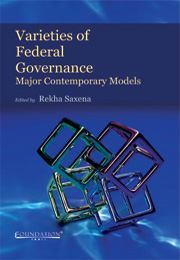Book contents
- Frontmatter
- Contents
- List of Contributors
- Foreword
- Acknowledgements
- Introduction
- I Theoretical and Comparative Dimensions
- 1 Federalism: An Alternative Category in Political Thought?
- 2 Governance of Capital Cities in Federal Countries: Comparative Perspectives
- II Presidential Federal Systems
- III Commonwealth Parliamentary Federations
- IV Non-Commonwealth Parliamentary Federations in Afro-Asia
- V European Parliamentary Federations
- VI Devolutionary Systems
- VII Supranational Confederalism/Federalism?
1 - Federalism: An Alternative Category in Political Thought?
from I - Theoretical and Comparative Dimensions
Published online by Cambridge University Press: 05 June 2012
- Frontmatter
- Contents
- List of Contributors
- Foreword
- Acknowledgements
- Introduction
- I Theoretical and Comparative Dimensions
- 1 Federalism: An Alternative Category in Political Thought?
- 2 Governance of Capital Cities in Federal Countries: Comparative Perspectives
- II Presidential Federal Systems
- III Commonwealth Parliamentary Federations
- IV Non-Commonwealth Parliamentary Federations in Afro-Asia
- V European Parliamentary Federations
- VI Devolutionary Systems
- VII Supranational Confederalism/Federalism?
Summary
For the historian of political thought who is not blinded by the officially sanctioned classical canon, the case is quite clear – federalism has been an alternative category of political thought only for a brief moment in the history of human affairs, those 350 years or so associated with the rise and the crisis of the modern state. And even this has been true only for a small part of the world – the western world of state organized capitalism. Elsewhere, and at other times, federalism has been the norm, the principal form of social organization.
As my linchpin of evidence I will use the political theory of Althusius which was first published some 400 years ago. It was explicitly directed against Bodin's doctrine of state sovereignty, and it systematically summed up the federalist wisdom of the pre-statist world. However, this chapter is not about Althusius. It is about Althusian evidences in theory and practice, past and present.
The core of the Althusian argument is that sovereignty cannot be constructed as an abstract category of absolute power, be it in the hands of a prince or an assembly, and that it must be understood instead as the result of a process of negotiated agreements among a plurality of autonomous collectivities. Ultimately, in other words, sovereignty exists only when and as long as that process works.
For political theory and for federalism this has important implications. If sovereign disposition upon the parameters of organized social life manifests itself as an ongoing process rather than a final product, everything is up for grabs.
- Type
- Chapter
- Information
- Varieties of Federal GovernanceMajor Contemporary Models, pp. 3 - 17Publisher: Foundation BooksPrint publication year: 2011
- 1
- Cited by



